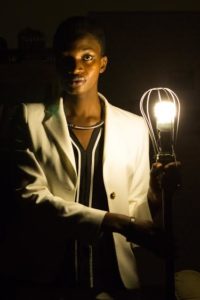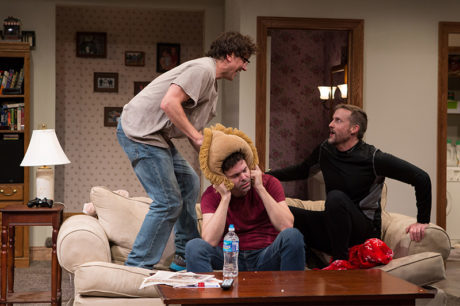Playwright Young Jean Lee’s audacious title refers to the particular—the white widowed father (Ed) and his three grown sons (Drew, Jake, and Matt) who are on stage for most of this naturalistic comedy—as well as the generality of straight white men (as in Jake’s mention of “people like us…privileged white dickheads”). So one might reasonably assume this play is all about the menz.

But there are some very interesting and important women in Straight White Men,beginning with the women of color we hear rapping some explicit heavy shit on a sonic-boom-level sound system as we enter The Studio Theatre’s Mead Theatre. And just before the play begins another woman of color steps on stage, a character identified in the program as Stagehand-in-Charge (played with riveting swagger and attitude by Jeymee Semiti). Semiti gives a cheeky cellphone speech, signals to the booth to kill the house lights, then appears wordlessly between scenes to briskly reset the stage.
Intriguingly, Lee’s script specifies that Stagehand-in-Charge be played by an actor who is “transgender or gender nonconforming…preferably a person of color.” (Semiti—who in real life is a human-rights activist for transgender equality—embodies nonbinary like nobody’s business. Her performance instantly commands the Mead stage and leaves no doubt she would own any role she was in.)
Lee’s script also specifies that “the pre-show music, curtain speech, and transitions… should create a sense that the show is under the control of people who are not straight white men.”
Under the control. Them’s some serious words.
I suspect audiences seeing this show will differ greatly in whether they grok that. Director Shana Cooper certainly did. But it’s entirely possible to pay attention to the four men in the play, all of whom are performed superbly, and not consciously notice the significance of all the women mentioned in the script. I take that to be a measure of Lee’s crafty and subversive coding.
The play is set in the family room of Ed’s house, where his son Matt also lives. Matt’s two brothers, Drew and Jake, have come home to celebrate Christmas, in a replay of playful childhoods past but with grownup tensions and anxieties. Ed’s wife, their mother, passed some years ago. Though her death hit Ed hard, he’s doing better now, and she has a warm place in the memories of her sons, who now direct their concern to their seventysomething dad. We never learn their mother’s name, strangely. But the script is constructed such that she’s an unseen character whose presence infuses just about everything that happens.
The first scene contains a hilarious sendup of how men are supposed to think and act. Jake and Drew obsess about craving Christmas cookies but desist because they’re fearful they’re getting fat. For about a page of dialogue, they sound just like— Well, you get the picture: Lee has begun deconstructing expectations.
We find out who their mother was to the brothers through a prop. In a closet they discover the board game she made for them when they were boys. It’s called Privilege. Their mother had taken a Monopoly game and given it radical political consciousness. When the box is opened, for instance, we see she has drawn under the lid the sixties raised-fist black power symbol. And on the game board itself is an anti-money symbol and the radfem raised fist inside a woman’s symbol.
With childlike delight, Drew and Jake begin to play again this homemade board game that was a fixture of their youth. First there are sight gags about gross ways to roll the die. (These guys do bro culture with perfect arrested-development authenticity.) Then, getting serious, Jake draws an Excuses card (converted by their mother from a Community Chest card):
“What I said wasn’t sexist/racist/homophobic because I was joking.” Pay fifty dollars to The Lesbian and Gay Community Services Center.
Then Drew soberly draws a Denial card (formerly a Chance card):
“I don’t have white privilege because it doesn’t exist.” Get stopped by the police for no reason and go directly to jail.
This is who their mother was. This was her love for them and her hopes for them. She was home-schooling them in how to be a decent human being. Or, as Ed puts it later on, “How else were you gonna learn not to be assholes?”
Ed, as we find out, was completely on board with his deceased wife’s teaching aid. “One of your mother’s craftiest inventions,” he calls it with respect. Ed (played by Michael Winters with a wonderful mix of warmth and gruff love) is himself a very decent man, kind and generous to family and neighbors, and he has tried with all his heart to be a good father to his boys. So too do we learn from this telling board-game scene that his wife tried with all hers to be the mother she knew they would need to have had as they grew up. She knew they would be growing up in a world where given their privilege they had a particular responsibility to act consciously and ethically, and she wanted them to know that too.

What the play is about then, is how the three grown brothers have handled differently the lessons their mother tried to instill in them when they were boys.
Jake (an appealing and slick Bruch Reed) has become a well-off banker, now divorced from the African American woman who is the mother of their two children. He is not handling the lessons well and he knows it.
JAKE: Look at me! I’m an asshole, but people kind of like me, whether they know it or not.
DREW: Jake, you’re not as big an asshole as you’d like to think.
JAKE: Yes, I am! My company’s run almost entirely by white guys, and I do nothing about it. I make “ironically” racist jokes, I give straight guys shit about “acting gay”, I talk about which of our interns I want to fuck. As much as I’d like to bring someone other than a white guy to a client meeting, the clients don’t want it, so I’d never do it. Together with my ex-wife, I’m raising our kids to be as white as possible, except for when their blackness makes them more appealing tokens.
Drew (a delightful and comically antic Avery Clark) has become a writer and college teacher whose last novel was “a radical attack on the crassness of American materialism.” Though he’s politically clued-in, his real commitment now is to his own self-actualization and happiness. Ironically it is his banker brother who calls him on his BS.
DREW: Jake, I know this may be a hard concept for you to grasp, but what makes me happy is using my abilities in service to something bigger than myself.
JAKE: Oh yeah? And who are you serving?
DREW: My students, my readers, my community–
JAKE: Oh come on, Drew, that’s just pursuing your ambition. How is being another white guy with tenure making a difference?
DREW: You can be a white guy and make a difference.
JAKE: No, our success is the problem, not the solution!
Matt (whose underlying unhappiness is very movingly portrayed by Michael Tisdale) was always regarded as the most gifted, the most promising. Now he has moved in with his father because he works as a lowly temp for a small social-change organization and is deep in student-loan debt. He is also deep into a depression that during the play precipitates a dramatic emotional breakdown. His brother Jake, again riding a righteous high horse, tries to shake Matt out of his self-deprecating, self-defeating negativity.
JAKE (To MATT): You believe a guy like you is supposed to sit down and shut the fuck up!
MATT: Nobody’s ever told me to shut up.
JAKE: Of course not, because you’ve always done such a good job of taking a backseat! All your female and queer and minority co-workers probably don’t even notice you’re there!
You’re being an ally, putting yourself in a service position, right? Making copies for the oppressed? You’re trying to live in accordance with what you believe.
ED: What’s that?
JAKE: That there’s nothing people like us can do in the world that isn’t problematic or evil, so we have to make ourselves invisible!…
Women and minorities may get to pretend they’re doing enough to make the world a better place just by getting ahead, but a white guy’s pretty hard-pressed to explain why the world needs him to succeed. So Matt’s trying to stay out of the way.
Clearly none of the brothers has completely forgotten or become oblivious to the lessons about privilege that their mother tried to imbue in them. Those lessons are as much their shared family culture as the goofy pajamas they all don on Christmas Eve. But their mother lingers over the play and their lives like an oracle. And like conflicted, equivocating disciples, the brothers wrestle before our eyes with how to live her lessons in real life. That they don’t succeed is the source of both the play’s hilarity and solemnity.
Were the brothers under the control of their mother? No. They were obviously loved and taught and influenced by her. But the script is explicit that despite her best intentions and efforts, her lessons did not stick as well as she hoped.
Many are viewing Straight White Men today as timely post-election social commentary. Some are also taking it to be an unwelcome personally impugning denunciation. I see it very differently. I see in Studio Theatre’s extraordinarily entertaining and canny production a play that speaks as profoundly as any I know to the challenge of living an honorable life in an unjust world where one’s privilege makes dishonor easy. The play is not about having answers. It’s not about telling anyone what to do. It’s about being honest about the struggle. And in that regard, Young Jean Lee has lain the problem bare.
Running Time: Approximately 90 minutes, with no intermission.
Straight White Men plays through December 18, 2016, at The Studio Theatre – 1501 14th Street, NW, in Washington, DC. For tickets call the box office at (202) 332-3300, or purchase them online.
LINKS:
David Siegel reviews ‘Straight White Men’ on DCMetroTheaterArts.
Review #2: ‘Straight White Men’ at The Studio Theatre by Amy Kotkin.
Spine: ‘Straight White Men’ by Young Jean Lee at The Studio Theatre by Robert Michael Oliver.
Magic Time! ‘Straight White Men’ at The Studio Theatre by John Stoltenberg.





